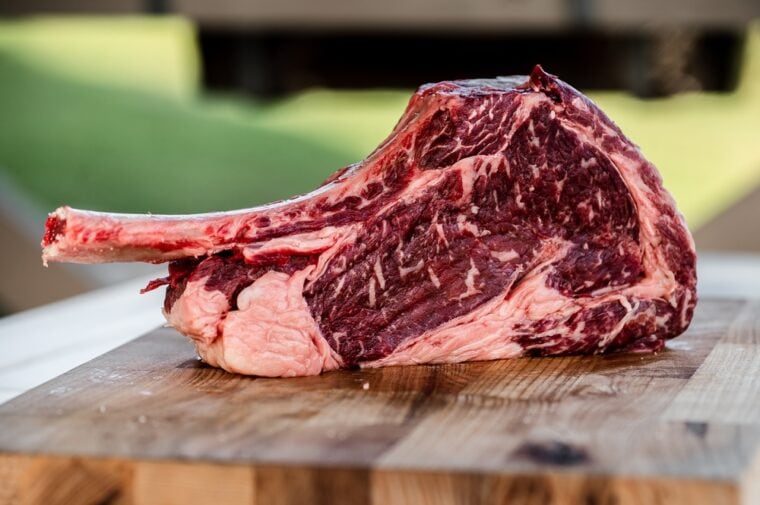
Click to Skip Ahead
It’s certainly not an unknown fact that our dogs love anything to do with meat—a fat, juicy steak, a dropped hotdog, or a decaying carcass in the grass. They love it all! But even though they love it all, they shouldn’t eat certain things—like steak bones.
Even though your dog might beg, plead, and sneak into the trash at 1 a.m. to eat steak bones, keeping them as far away as possible is in their best interest, especially if they are cooked. In this article, we will explore why steak bones, and any other cooked bones, are bad for your pooch.
Dogs Shouldn’t Eat Steak Bones
Raw steak bones are always a better choice than the cooked varieties. Cooked steak bones can easily splinter and become choking hazards and gastrointestinal blockers. Ingesting a steak bone can lead to expensive vet bills and even an untimely death.
But, of course, that doesn’t mean that raw steak bones come without risk. When you give a dog raw meat product of any kind, it could infect your dog with harmful bacteria and there is still the risk of them causing an intestinal obstruction.
Below, we will explore the consequences of giving your dog steak bones and inform you of better alternatives and safer feeding options.
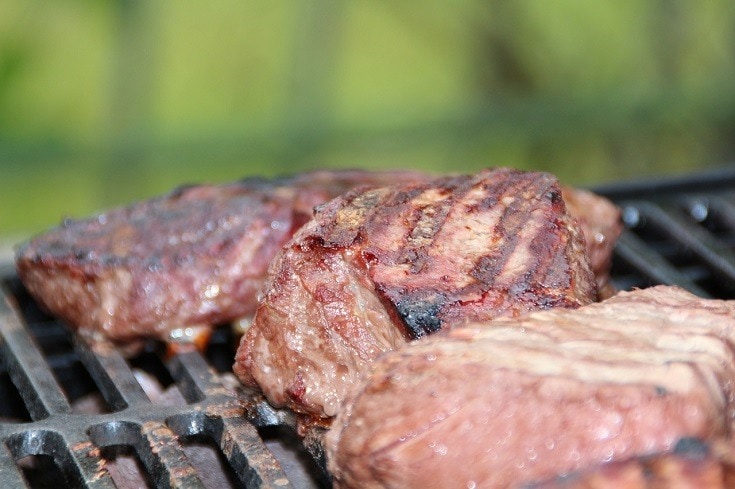
The 4 Dangers of Cooked Steak Bones
Unfortunately, there are no benefits to cooked steak bones. When a steak bone is cooked, it breaks down the strength of the bone, making it more brittle. When the bone itself breaks apart, it can splinter and create sharp edges that can harm your dog.
They just have far too many risk factors and complications. Plus, cooking the bone will deplete it of some of its vital nutrients. Dogs are much better off with bone broth as opposed to the bone itself.
1. Mouth Injury
If your dog splinters a steak bone, it can puncture the mouth’s gums, tongue, and soft tissues, resulting in injury.
This can lead to infection, which may require a round of antibiotics. Depending on the severity of the injury, it might require stitches or other veterinary intervention.
2. Choking Hazard
If your dog swallows a splintery piece of steak bone, it can lodge in the throat and esophagus, creating an obstruction. The blockage can be partial or full, making it difficult or impossible for your dog to breathe properly (if blocking the windpipe).
As you can imagine, this is a time-sensitive and life-threatening emergency. Removing a steak bone can also be difficult because these sharp pieces will prevent it from sliding out easily, and it might even require surgery.
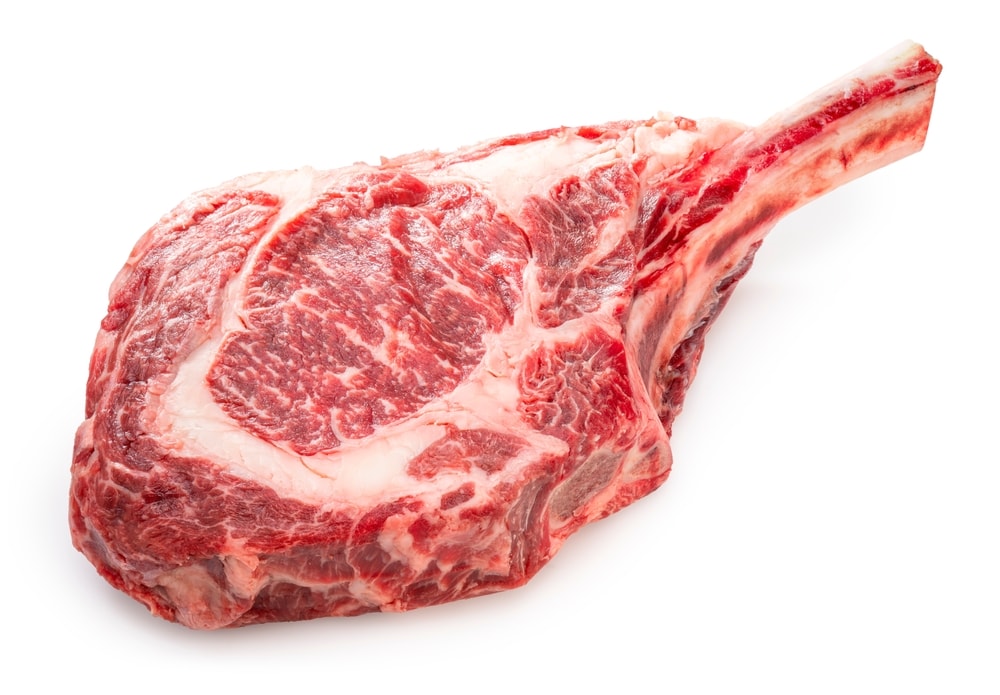
3. Intestinal Blockage
Once the dog’s body tries to digest the swallowed steak bone, it can have difficulty passing through the intestines. If it lodges in the intestines, it can cause a complete or partial blockage.
The biggest danger with intestinal blockages is that the changes are not always visible immediately. Your dog might only show mild signs of discomfort shortly before being completely debilitated.
Depending on the severity of the blockage and where the bone has become stuck, some pass on their own, while others require emergency surgery. These visits can be extremely high-risk for your dog and pricey and worrying for you. Unfortunately, the seriousness of an intestinal blockage does lead to the loss of some beloved pets.
4. Organ Punctures
If your dog doesn’t swallow a big enough piece to obstruct their throat or intestines, it can still cause problems for the organs the bone passes through. Tiny little shards can scratch, irritate, or puncture the intestines, causing severe pain and risk of peritonitis (inflammation of the lining of the abdomen). If the boney shards manage to puncture other organs, other signs can be seen, such as internal bleeding.
It can be hard to distinguish the issue based on signs alone, as they are so similar to other issues. If you believe your dog is at risk of any issue mentioned above, get them to your vet immediately.
The 2 Dangers of Raw Steak Bones
Raw steak bones are much preferred over the cooked alternative. However, they come with risks of their own.
1. Foodborne Illness
The biggest risk of raw steak bones is the potential for foodborne illness, like harmful bacteria including Listeria, E. coli, and Salmonella species. While these bacteria may or may not cause your dog to be unwell, they pose a significant health risk to the humans in the household, especially children, pregnant or immuno-compromised people.
When these bacteria enter the digestive tract of the dog, they can cause various side effects that can make your dog unwell.
If you notice your dog is showing any of these signs, it is best to take them to the vet for assessment, particularly if you know they have eaten something untoward.
2. Broken Teeth
Bones are extremely hard and can be brittle which means that dogs often break their teeth while chewing on raw bones. A broken tooth is painful and requires treatment. This is often costly and requires a general anesthetic to remove the tooth or to carry out root canal treatment.
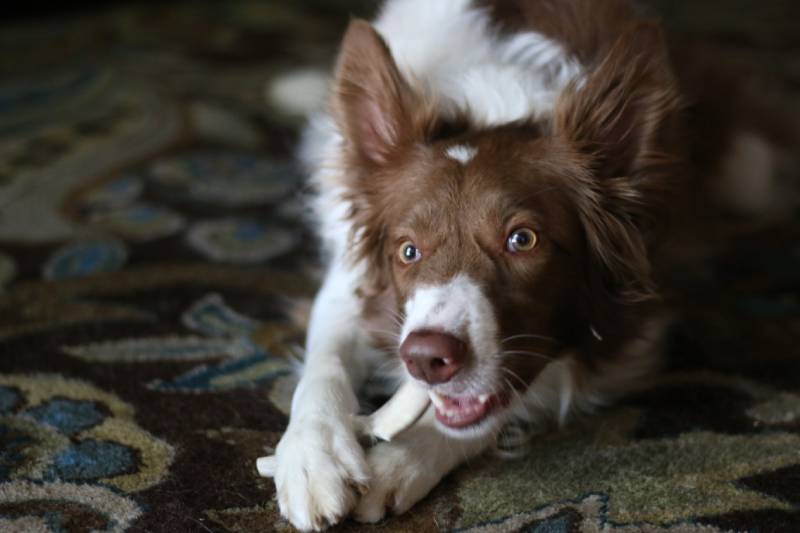
Benefits of Raw Steak Bones
We would be fibbing if we said that steak bones have no nutritional value for your dog. The fact of the matter is that dogs are instinctively drawn toward meat products because they are omnivores with a strong inclination toward the meat portion of the diet.
Dogs need high-quality animal proteins in their everyday lives so it is no surprise that they are attracted to steak bones.
Bones contain calcium, magnesium, and phosphorus, so they certainly do have some nutritional benefit to dogs. However, the risk of giving your dog a bone outweighs the benefit it gets from the bone.
So, there are certainly upsides to steak bones. But dogs still shouldn’t eat them simply because there are so many risks associated with eating them.
The 6 Safer Alternatives
There are plenty of safer alternatives for your dog besides steak bones. Some of them are still controversial, so we recommend checking with your veterinarian before making any changes. Here are a few options you can discuss with them.
1. Antlers
While antlers can still pose a choking and tooth breaking hazard, they could also benefit your dog since they are more durable and full of potassium, zinc, manganese, and calcium. You can purchase antlers from pet shops or online sites. We don’t recommend feeding your dog self-obtained antlers.
2. Bully Sticks
Bully sticks are made from the muscle of a bull penis. These chews might sound disgusting to you, but they are highly digestible, and most dogs will love the taste! They don’t splinter so you don’t have to worry about the smaller bits causing injury.
3. No-Rawhide Chews
Rawhides are getting a pretty bad rap nowadays for the way that they are created and the fact that they are not easily digested by dogs. Rawhide can and does cause intestinal blockages in dogs, so is best avoided. No-rawhide chews are made from natural ingredients and are arguably safer for your dog because they are digestible.
4. Hooves
Hooves are becoming a popular alternative to animal bones, but they come with their share of risks. For heavy chewers, they can splinter the hoof, creating a choking and laceration hazard. So we only recommend this particular treat for light to moderate chewers.
5. Himalayan Chews
Himalayan chews are also referred to as yak cheese. These choices are made from yak milk in Nepal that is hardened, completely organic, and nutritious for your pup. These types of chews might be a little tricky to find, but you can usually order them from online shops.
6. Bone Broth
Bone broth is a highly nutritious additive with which you can spruce up your dog’s diet. If you don’t want them to have steak bones but want them to reap some of the nutritional benefits, this is a great way to draw out the nutrients from existing bones and serve it up in liquid form.
Bone broth carries a variety of nutritional properties and is a really delicious topper for dry kibble, moistening the pieces and creating a robust flavor.
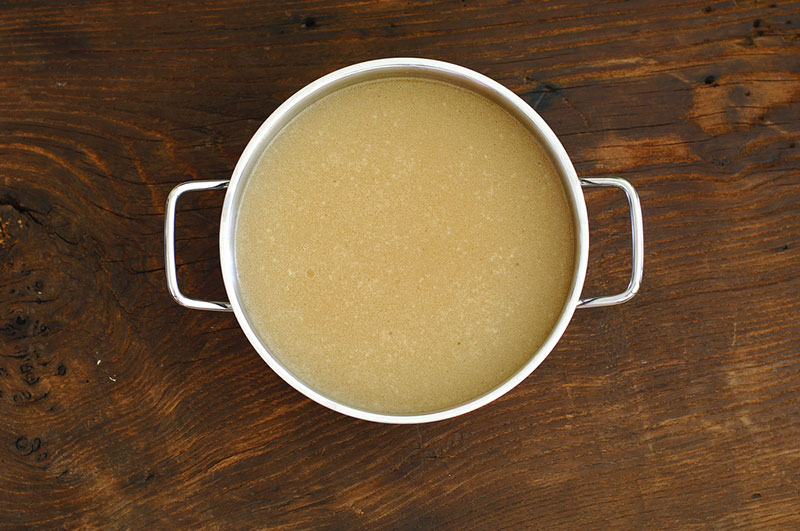
Conclusion
Now you understand that although steak bones have their benefits for your canine companion, the risks far outweigh those benefits, especially when so many healthy, safer alternatives exist.
Make sure that you call your vet immediately if you find your dog has managed to sneak a cooked steak bone. Cooked bones can cause a range of issues ranging from mouth lacerations to intestinal blockages. Your vet will advise you on what is best to do next. If you do choose to give your dog a raw bone (although not advised), make sure it is longer than your dog’s muzzle to prevent it being swallowed whole, and remove the bone as soon as your dog manages to crack it. Make sure to disinfect the areas that your dog has been with the raw bone to keep everyone in the household healthy.
Featured Image Credit: Norbertas, Shutterstock










